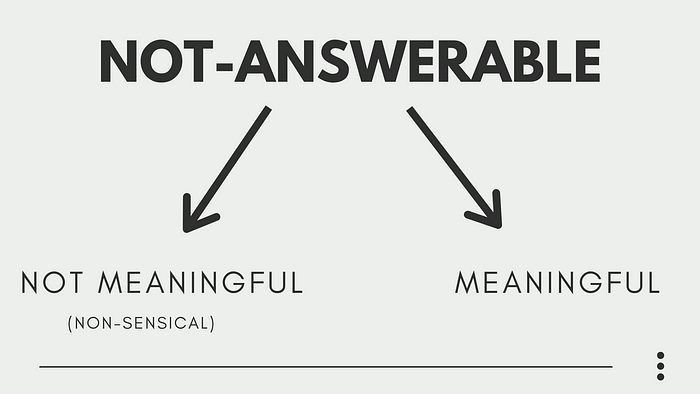“Why Is There Something, Rather Than Nothing?” The Different Types of Answers

Why is there something, rather than nothing?
This may be perhaps the biggest question in all of philosophy and many great philosophers, scientists, researchers, and others have commented on it and even attempted to answer it.
In fact, the great 20th-century philosopher Martin Heidegger called it “the fundamental question of metaphysics”.
The question seems to stir a sense of awe in many who have asked because after all, it seems more logical that there should be nothing at all, yet clearly there is something.

When we ask the question why is there something rather than nothing, we’re referring to the totality of existence, not just something specific like our universe or why the Big Bang happened.

Now before we attempt to answer this question, we need to carefully examine it, specifically how we’re asking the question. Philosophers such as Ludwig Wittenstein wrote about how language is a source of much philosophical confusion. Philosophers spend decades and centuries puzzling over philosophical questions that perhaps were illogically formed to begin with, and thus unanswerable the entire time
Two Ways to Ask the Question
When we begin to question the question, we find that there are two ways to formulate it.
Version A. Why does anything at all exist, rather than nothing?
Version B. Why does anything at all exist?

They may sound essentially the same, but I think one question presupposes something that the other doesn’t actually making them different.
Both presuppose that something exists of course, but question A presupposes that it’s possible that the concept of ‘nothing at all’ can exist too.
For example, we can think of this concept as…
- Possibly there might not have been anything
- It’s possible a state of nothing can exist
- There is a possible world in which nothing exists.
In other words, the ‘rather than…’ part of question A is presupposing that ‘nothing existing’ is a necessary state while question B does not.

What’s the Difference?
Why is this difference important? It’s important because since we’re already assuming nothing is a necessary state, no explanation can be given in terms of a contingent entity. That means the answer to question A is limited to either an infinite series of causes or some sort of entity or fact like God, that is noncontingent and explains itself.
The very structure of question A rules out answers that question B does not.
On the other hand, question B is more neutral and does not presuppose that only what is contingent can exist. Here, we’re not presupposing that ‘nothing’ is a necessary state and something is contingent or non-contingent. Therefore, I think we need to throw out the question ‘why is there something rather than nothing’ and going forward, why does anything at all exist?
Next, before we start tackling the question let’s talk about responses vs answers to the fundamental question.

Responses vs Answers to the Question
Philosophers, scientists, researchers, etc. all have different responses to the fundamental question and some responses may include an answer to solving it. On the other hand, some philosophers may respond that the question is unanswerable or even nonsensical.
Almost all the responses you’ll hear will fall into these categories.
First, the question can be answerable or not answerable.

If the response is a ‘not answerable’ one, then the response can fall into two different categories, meaningless and meaningful.

A meaningless response just means the question itself is illogical or a pseudo question. It’s not meaningful and we can’t answer it. On the other hand, the question may be meaningful, but still unanswerable at this time.
If there is an answer it will most likely be one of the following: necessitarian, theistic, nomological, or brute-fact.

Necessitarian answers claim that there’s a logical explanation to the question. Why is there anything at all? Because it is a necessary truth that something has to exist.
Theistic answers state that there’s a God or divine being that is a cause unto itself which explains why anything at all exists.
Nomological answers such as those by philosopher John Leslie, Nicholas Rescher, and others, basically claim that there is a realm of abstract concepts, probabilities, or “proto-laws” as Rescher calls them, that are separate from the realm of concrete things and are responsible for why something exists.
In the brute-fact response, no explanation is needed to be given for why something exists. There is a brute fact somewhere in the universe that we must accept that explains existence.
In Conclusion
Of course, this is just a small look at one of philosophy’s biggest, deepest questions. What do you think of rephrasing the question and these responses? Are there any responses I forgot?
I’ll be exploring each of these responses in coming Medium articles and I’ll see which one of these responses is the most logical. So, make sure to follow me below if you’re interested.
The Rest of the Articles in This Series Including the Best Answer:
Part 1. Questioning the Question and Types of Responses:
https://thinkingdeeply.medium.com/the-types-of-answers-to-why-is-there-something-rather-than-nothing-7360f54253f
Part 2. The Probabilistic Argument for Existence (Nozak & Van Inwagen): https://thinkingdeeply.medium.com/the-probabilistic-argument-for-why-anything-exists-at-all-examined-van-inwagen-nozick-6fd7f209d11d
Part 3. Modal Realism and Probable Worlds Argument (David Lewis): https://medium.com/curious/does-modal-realism-explain-why-anything-at-all-exists-db3c43a45df9
Part 4. Necessitarian Theistic Argument (Leibniz & Craig) https://thinkingdeeply.medium.com/does-god-explain-why-there-is-something-rather-than-nothing-1ba79fd90639
Part 5. The Brute Fact Argument (Hume & Russell) https://thinkingdeeply.medium.com/does-the-brute-fact-argument-explain-why-is-there-something-rather-than-nothing-189eb0289aa9
Part 6. Axiological Arguments (Leslie, Rescher, Tegmark) https://thinkingdeeply.medium.com/do-abstract-objects-explain-why-anything-exists-at-all-axiological-arguments-for-existence-fc9b194a3af9
Part 7. Is the Question Meaningless? (Wittgenstein, Edwards, Positivism, Smith) https://thinkingdeeply.medium.com/is-the-question-why-is-there-anything-at-all-actually-meaningless-1c8f2ce96703
Part 8. The Best Response: https://thinkingdeeply.medium.com/why-is-there-something-rather-than-nothing-the-best-answer-e568f468459a

Plus, Subscribe for Philosophy Videos on YouTube Via My Channel Here:
References:
- https://plato.stanford.edu/entries/wittgenstein/
- https://plato.stanford.edu/entries/nothingness
- https://plato.stanford.edu/entries/cosmological-argument/
- https://www.researchgate.net/publication/332675337_Why_is_there_anything_at_all_What_does_it_mean_to_be_a_person_Rescher_on_metaphysics
- Images appear via Wikimedia Commons or Canva.com
